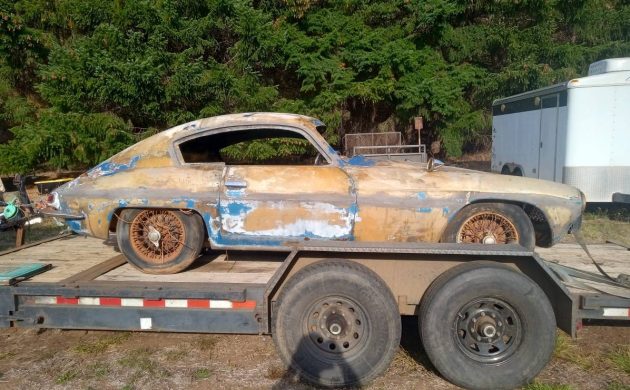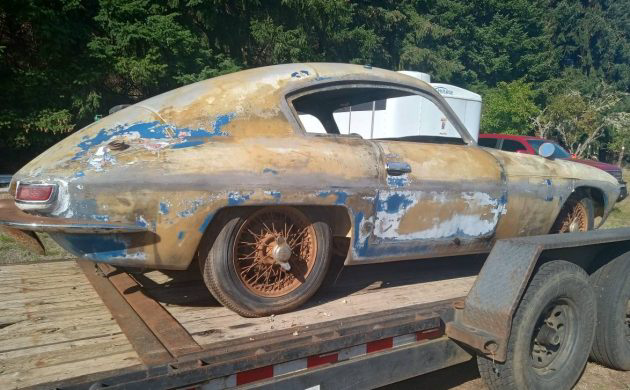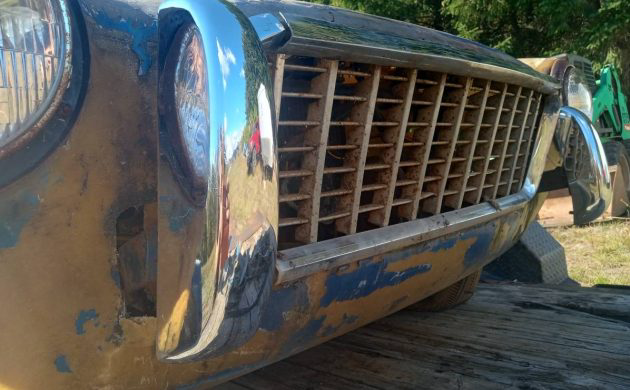America was obsessed with sports cars in the fifties. From the British imports that were making the trek across the Atlantic to the various domestic renditions of the sports car theme, enthusiasts had several fascinating choices at their disposal. There was also a plethora of up-and-coming designers, businesspeople, and sports car nuts who dove headfirst onto producing sports car bodies for custom and existing frames. These upstarts used fiberglass as their medium and many of them produced quite stunning designs before they disappeared into automotive history. Now there is renewed interest in these vehicles among the concours set. If your collection lacks a fiberglass-bodied sports car from the fifties, adding a car like this 1957 Victress C2 coupe for sale on Craigslist in Roseburg, California may satisfy your needs. Sitting on an MGA chassis, this European-styled sports coupe can be yours for an asking price of $7,800. Is this the oddball project you have been looking for?
In 1951, a handful of sports car enthusiasts opened the Victress Manufacturing Company in the enthusiast hotbed of Southern California. While the company had no chance of offering production cars, its efforts were focused on creating fiberglass bodies for existing chassis and for a frame manufactured for them by the Mameco Corporation in Los Angeles. Using fiberglass allowed Victress to replicate the complex curves of coach-built European sports cars at a fraction of the cost and effort. Bodies would be sold to customers and they would be responsible for assembling the car and completing the bodywork.
As you can expect from such endeavors, the company never managed to become a full-fledged automaker. They did have limited success using a wind tunnel to sculpt their final product into cars that exhibited design cues from many different European sports cars. A decade later, after punching out a limited number of models such as the S1, C2, and C3, the company’s focus shifted to contract work for the United States government. The fiberglass body business ended up being sold to La Dawri and yet another footnote was added to automotive history.
Victress-bodied vehicles are almost unheard of today despite their impressively good looks. The company offered bodies for such wide-ranging chassis as those from MG, Austin-Healey, and Volkswagen. The car seen here is out of a 40-year collection and claimed to be based on an MGA, which was introduced in 1955 as a body-on-frame vehicle. The question is why someone would be quick to replace the MGA’s stunningly beautiful body unless the original sheet metal was damaged beyond repair. The three pictures we are given show MGA wire wheels and a silhouette that looks a whole lot like Jaguar’s later E-Type that debuted in 1961. There is an MGA drivetrain under all that fiberglass, and a replacement engine will come with the car as well.
Restoring a car such as this is often quite challenging. Victress did not have the benefits that a traditional automaker enjoys in finances and talented engineers to work out the fine details needed to refine a vehicle. The outline of the side glass is an example of this. There appears to be no provision for glass at all unless there is a wind-up window section in the door and the quarter glass assembly is hiding inside the car. It would be nice if the seller had included many more photographs of this rare vehicle so prospective buyers could get a better idea of what they are getting into. Talking to restorers of such vehicles, working with the cars to accomplish such simple tasks as weather protection, and outfitting a proper interior are exercises in frustration. There is little in the way of patterns and/or parts for such vehicles. Skyrocketing values have made such efforts worthwhile if you can find a good example and have the talent to work through a car like this.
Perhaps the most pleasing aspect of owning a car like this is that you would be a shoo-in to enter many of the concourse-style events that have popped up all over the country. These events are always on the lookout for distinctive vehicles that have an interesting story and are seldom seen. All it will take is the asking price, transportation to your garage, and the addition of lots of money, time, effort, and talent.
Would you take on a project like this? Why or why not? Please share your thoughts in the comments.








Among a lot of other things, you’ll need the ability to hand craft some parts and also several rear view mirrors.
I have never seen one before, however the styling is quite stunning. It would be a project I would take on if I had nothing else going on as this would take full attention. The restorer need to be creative as much of the visual work looks to be hand crafted. Mechanically, MGA and MGB parts could be sought for usage. The price is a bit steep for my project taste as being on the east coast, I would be looking at $10K to get it at my doorstep before I even took out one bolt!! It is a California project with all the resources they have out there!
Only 3 pics? I was at this estate sale on the 18th in Oregon, and was going to take pics of it, the seller wanted $4k for it but it was sold.
So cool. I wish there were more pictures.
Well, on the plus side, all of the mechanicals should be easy enough to sort if it is in fact a MGA chassis. But the body and interior is going to be a long and expensive odyssey, even for someone with the talent to do is themself. But what a finished product it would be!
This body was also sold by LaDawri as the Castillian. I owned two, one with a 409 V8, the other with an early 392 Hemi. I bet they both could make fast order out of that little MG four banger!!
These glass kit are fun to build but take lot of time if you do it your-self. Mine is a LaDawri Conquest that I started in the late 60’s mounted on a 51 HJ frame and drive train. Worked on it off and on between other peoples project cars. These cars are never done, every time I drive it I see things that I feel need to be changed, If I were younger I would like to do another one from scratch and make these changes as I go along. Fun to drive here in Ocala area and get lots of attention. Mine has removable hard-top
That’s concours, not concourse.
Of cours it is. Everybody knows that!
Except the writer!
When you are fighting auto correct and Grammarly for control of every paragraph, these things happen. Sorry.
I wonder if I’m related to this car?
Getting a windshield for this should be fun unless it is MG glass or something.
MGAs were pretty unloved until around 1980. Basically a modern body on a TD/TF and the twin cam fiasco, tragedy really, didn’t help.
Maybe replace the XPAG with something less rare, a hot rod Volvo would be period correct and could make two or three times the power with cheaper parts. Or find a Chevy LFX V6 and transmission in a junk Camaro. Probably get axle and brakes while you are at it.
Tri Valley Glass In Livermore would be able to do the glass, source roll up mechanisms and do an interior too Was just in there a couple of days ago, great place.
Any Corvette body shop could do the paint.
Just takes money.
Sure looks nice.
The glass for front & rear is about 1950 Dodge or Plymouth. Funny this car was in Oregon as my two were also found there and I knew of 3 or 4 more in the Portland area. Well, Les Dawes was from British Columbia, not too far away yet I understand the bodies were made in Long Beach California.
the seller replied to my email & added more pics. much better than 3 pics.
Les and Joan produced them at LaDawies Coachworks in California. The body shell came with patterns and instruction book on how to mount body on your frame and other information such as the Conquest windshield is 60’s Chev pickup installed upside down
Looks a bit like a Cunningham C3.
ferrari 250 gto?
I don’t see a bit of GTO here.
Different in most ways.
This is a rebody that most can’t tell from real.
Potential here. Good basic design proportions. Some creativity requered on grill and rear lights should make this rebel an eye catcher.